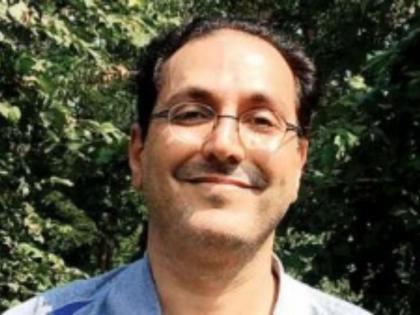Meet The Man Who Forced BMC To Accept There Is No Undersea Tunnel
By Snehal Mutha | Published: April 5, 2024 09:26 PM2024-04-05T21:26:18+5:302024-04-05T21:28:38+5:30
Mumbai's infrastructure woes, spanning projects like the Coastal Road, Metro lines, and even the seemingly straightforward Gokhale bridge, have ...

Meet The Man Who Forced BMC To Accept There Is No Undersea Tunnel
Mumbai's infrastructure woes, spanning projects like the Coastal Road, Metro lines, and even the seemingly straightforward Gokhale bridge, have become a subject of national ridicule, drawing sharp criticism toward the responsible government agencies. Mumbai's infrastructure has been reportedly messed up in more than one one-way, becoming a joke for many.
With vigilant eyes on every move, citizens closely scrutinize the actions of entities such as the Brihanmumbai Municipal Corporation (BMC), Mumbai Metropolitan Region Development Authority (MMRDA), Mumbai Metro Rail Corporation Ltd (MMRCL), and more. Zoru Bhathena, an engaged citizen and environmental activist, shed light on Mumbai's unsuitable transport infrastructure in a conversation with Lokmattimes.com .
Zoru Bhathena addressed the controversy surrounding India's purported first underwater tunnel, highlighting discrepancies in its planning and execution. He questioned the assertion of the Coastal Road as an underwater tunnel project, emphasizing the need for transparent representation. He spoke about the complex mix of history, politics, and engineering involved. He said, "The Coastal Road was never intended to be an undersea tunnel. We have repeatedly urged the BMC to consider extending the tunnel under the sea to avoid the need for extensive reclamation. It's evident that the authorities were aware of this fact, yet they falsely claimed it was India's first undersea tunnel. Why take pride in something that doesn't align with reality?"
Read More: Mumbai Coastal Road Tunnel Witnesses First Accident After Inauguration (Watch Video)
Bhathena explained that the Coastal Road project was initially conceived in the 1970s, with plans to extend it to Nariman Point, which currently sits at Marine Drive. Originally proposed to be built on stilts, the government later decided to change the plan to a road on reclamation. However, the project faced stagnation for 10-15 years, during which time costs escalated from Rs. 500 crore to Rs. 1500 crore.
Question: Are you satisfied with what BMC has been doing in the matter of Gokhale Bridge?
Bhathena expressed dissatisfaction with the BMC's approach. He criticized the decision to opt for reconstruction instead of repairs and the complete closure of the bridge, disrupting vital east-west connectivity in Andheri. Bhathena expressed dissatisfaction with the bridge's construction for several reasons. Additionally, issues with the Barfiwala flyover and the poor condition of roads leading to Teli Galli underscored systemic failures in infrastructure development.
Bhathena said, "Andheri's Gokhale Bridge can only be put in the joke section of the newspaper because they messed up pretty badly. A simple engineering work was posed as an engineering marvel, and that marvel also went wrong. Yet BMC claimed the bridge to be a marvel over the fastest completion of work in India."
According to Bhathena, the pedestrian section of the bridge collapsed in 2018, resulting in loss of lives. Investigations revealed that the collapse was due to the bridge's inability to bear loads beyond its design limits, particularly from water pipes and electricity cables. While the central part of the bridge fell under the jurisdiction of both the railways and the BMC, the eastern and western sections were solely the BMC's responsibility. Although the central segment was deemed structurally sound, the eastern and western portions required repairs. However, the BMC chose reconstruction over repair.
Bhathena criticized the BMC for hastily shutting down the Gokhale bridge without adequate planning, design, tendering, or contracting processes. Despite starting work in November 2022 with a promised completion date of May 2023, progress was hindered by issues such as strikes in steel factories. The prolonged closure of the Gokhale bridge resulted in severe traffic congestion in suburban areas, stretching as far as Bandra and Jogeshwari.
Question: Why do you insist that buses are a better alternative to metros?
Referring to the inconvenient ground connectivity, Bhathena contended, "Claims that metros will alleviate traffic and reduce air pollution are entirely misleading. While people may need them for commuting, the lack of last-mile connectivity poses a significant challenge and hence Bhathena insists on having efficient BEST bus connectivity. "After disembarking from the metro, commuters often resort to using cars or bikes to reach their final destinations. This defeats the purpose of using the metros. It's essential to establish ground-level connections to address this issue. Comparatively, BEST buses are more heavily utilized than the metro due to their convenience", said Bhathena.
Bhathena criticized the lack of proper planning, inadequate assessment of metro line requirements, traffic congestion, and the high cost associated with metro projects. Stating an example, he said, "Take, for instance, the underground metro planned from Colaba to Andheri to Aarey in the 1980s, when Nariman Point was a bustling business hub. Fast forward to its execution in 2020, and Nariman Point is now half empty. The metro route focuses on areas like Cuffe Parade, BKC, and Seepz. People working in BKC usually come from Virar, which they will do by having a metro line to Cuffe Parade. This execution only disrupts entire green covers, gardens, forests, and Aarey without proper consultation. The government's narrative of reducing traffic and improving air quality through metro development is a lie. Despite Delhi boasting 300 kilometers of metro lines, traffic congestion and air pollution remain prevalent issues."
Furthermore, Bhathena added, "The government allocates significant funds, amounting to 1 lakh crores, for metro construction but fails to prioritize the operation of BEST buses. With minimal investment, the government could enhance bus frequency and reduce fares, yet they opt for further complicating Mumbai's transportation system."
Open in app